- Home
- Naguib Mahfouz
Three Novels of Ancient Egypt Page 4
Three Novels of Ancient Egypt Read online
Page 4
“As for those workers who are in fact Egyptians, most of them are from the southern part of the country. These are people with self-respect, pride, steadfastness, and faith. They are able to bear terrific torment, and to patiently tolerate overwhelming tragedies. Unlike those aliens, they are aware of what they are doing. They believe in their hearts that the hard labor to which they devote their lives is a splendid religious obligation, a duty to the deity to whom they pray, and a form of obedience owed to the title of him who sits upon the throne. Their affliction — for them — is adoration, their agony, rapture. Their huge sacrifices are a sign of their subservience to the will of the divine man that imposes itself over time everlasting. My lord, do you not see them in the blazing heat of noon, under the burning rays of the sun, striking at the rocks with arms like thunderbolts, and with a determination like the Fates themselves, as they sing their rhythmic songs, and chant their poems?”
The listeners were delighted, their blood gladdened in a swoon of gaiety and glory, and contentment glowed on Pharaoh's strong, manly features. As he rose from his couch, his movement sent all those in attendance to their feet. In measured steps, he processed with dignity down the broad balcony until he reached its southern edge. Contemplating its magnificent view, he peered into the remote expanse at that deathless plateau of the dead on whose holy terrain were traced the long lines of toilers. What augustness, and what grandeur! And what suffering and struggle in their pursuit! Was it right for so many worthy souls to be expended for the sake of his personal exaltation? Was it proper for him to rule over so noble a people, who had only one goal — his own happiness?
This inner whispering was the only disturbance that beat from time to time in that breast filled with courage and belief. To him it appeared like a bit of wandering cloud in heavens of pure blue, and, when it came, it would torment him: his chest would tighten, his very serenity and bliss would seem loathsome to him. The pain worsened, so he gave the pyramids plateau his back — then wheeled angrily upon his friends, catching them off guard. He put to them this question: “Who should give up their life for the benefit of the other: the people for Pharaoh, or Pharaoh for the people?”
They were all struck speechless, until the commander, Arbu, broke through them excitedly, calling out in his stentorian voice, “All of us together — people, commanders, and priests — would give our lives for Pharaoh!”
Prince Horsadef, one of the king's sons, said with intense passion, “And the princes, too!”
The king smiled vaguely, the anxiety easing on his sublime face, as his vizier Hemiunu said, “My lord, Your Divine Majesty! Why differentiate your lofty self from the people of Egypt, as one would the head from the heart or the soul from the body? You are, my lord, the token of their honor, the mark of their eminence, the citadel of their strength, and the inspiration for their power. You have endowed them with life, glory, might, and happiness. In their affection there is neither humiliation nor enslavement; but rather, a beautiful loyalty and venerable love for you, and for the homeland.”
The king beamed with satisfaction, returning with long strides to his golden divan. As he sat down, so did the rest. But Prince Khafra, the heir apparent, was still not relieved of his father's earlier misgivings.
“Why do you disturb your peace of mind with these baseless doubts?” he said. “You rule according to the wish of the gods, not by the will of men. It is up to you to govern the people as you desire, not to ask yourself what you should do when they ask you!”
“O Prince, no matter how other kings may exalt themselves — your father need only say, “I am Pharaoh of Egypt,’ “ Khufu rejoined.
He then seemed to swell up as he said with a booming voice — yet as though speaking to himself, “Khafra's speech would be appropriate if it were directed toward a weak ruler — but not toward Khufu, the omnipotent — Khufu, Pharaoh of Egypt. And what is Egypt but a great work that would not have been under taken if not for the sacrifices of individuals? And of what value is the life of an individual? It equals not a single dry tear to one who looks to the far future and the grand plan. For this I would be cruel without any qualms. I would strike with an iron hand, and drive hundreds of thousands through hardships — not from stupidity of character or despotic egotism. Rather, it's as if my eyes were able to pierce the veil of the horizons to glimpse the glory of this awaited homeland. More than once, the queen has accused me of harshness and oppression. No — for what is Khufu but a — wise man of far-seeing vision, — wearing the skin of the preying panther, — while in his breast there beats the heart of an openhanded angel?”
A long silence settled upon them, his companions longing for their nightly session of exquisite small talk, so they might forget their ponderous troubles. All of them hoped that the king, after he'd had his fill of projects and purposes, would propose some entertaining sport, or invite them to a party with libations and song. But in those days Khufu complained in his leisure hours of boredom with the palace and its spectacular aspects. When he learned that the time for diversion had come, he would grow weary, looking around at his friends as though in a daze. Hence, Hemiunu queried, “Has my lord filled his cup with drink?”
Pharaoh nodded his head. “I drank today, as I drank yesterday.”
“Shall we call in the lady musicians, sire?”
Indifferently, he answered, “I listen to their music night and day.”
Mirabu interjected, “What would my lord think about going on a hunt?”
The king responded in the same tone, “I'm fed up with the chase, be it on land or water.”
“In that case, what about strolling among the trees and flowers?”
“Is there, in this valley, a beautiful sight that I have yet to behold?”
The king's laments saddened his loyal retainers — all except Prince Hordjedef, who was saving a delicious surprise for his father, of which Pharaoh had no hint.
“O my father the king,” said Hordjedef, “I am able to bring right before you, if you desire, an amazing magician who knows the secrets of life and death, and who is able merely to command something to be, and it is.”
Khufu said nothing, this time not hastening to reaffirm his boredom. He looked at his son with interest, for the king followed closely the news of the wizards and their wonders, enjoying what was said about their rare contrivances. Pleased that he would be seeing one of them before him, he asked his son, “Who is this magician, Prince Hordjedef?”
“He is the sorcerer Djedi, my lord. He is a hundred and ten years old, but still strong as a young tough. He has an astonishing power to control the will of both man and beast, and vision that can penetrate the Veil of the Invisible.”
Pharaoh grew intrigued, his ennui waning. “Can you bring him to me here, now?” he said.
“Please bear with me a few moments, sire!” the prince replied, joyfully.
Hordjedef stood up and saluted his father with a prolonged bow — then rushed off to fetch the fabulous magician.
2
Soon prince Hordjedef returned — with a tall, broad-shouldered man — walking before him. The man's gaze — was sharp and piercing. His head was crowned with a mane of soft white hair, and a long, thick beard fell over his breast. Wrapped in a loose robe, he steadied his step with a crude, massive cane.
The prince bowed low and announced, “My lord! I present your obedient servant, Djedi the magician.”
The sorcerer prostrated himself before the king, kissing the ground between his feet. Then he said, in a powerful voice that made all those who heard it quake: “My lord, Son of Khnum, Radiance of the Rising Sun and Ruler of the Worlds, long live his glory, and may happiness settle within him forever!”
Pharaoh eyed the wizard warmly and sat down close to him, saying, “How have I not seen you before, when you have preceded me into the light of this world by all of seventy years?”
The superannuated sorcerer answered in a kindly tone, “May the Lord grant you life, health, and strength: the li
kes of me are not favored to appear before you without being asked.”
Regarding him benignly, the king pressed him, “Is it true that you can make miracles, Djedi? Is it true that you can force your will on both man and beast, and that you can snatch the Veil of the Invisible from the face of Time?”
The man nodded his head until his beard bounced on his chest. “That verily is true, sire,” he replied.
“I would like to see some of these miracles, Djedi,” answered Pharaoh.
And so came the frightful hour. The eyes of those watching widened, their faces full of obvious fascination. Djedi did not rush to his task, but stood frozen for a long while as though turned into stone. Then he shot a sharp-toothed grin as he looked them over quickly.
“To my right there beats a heart that does not believe in me,” said Djedi.
Those gathered were shocked, and exchanged confused glances. The monarch — was pleased — with the keen eye of the magician, and turned to ask his men, “Is there one among you who denies the truth of Djedi's miracles?”
Commander Arbu shrugged his shoulders disdainfully, then marched before the king. “My lord, I do not believe in magic tricks. I see them as a kind of sleight of hand, a skill for those who have the time to devote to it,” he said.
“What's the point of talking when we have the man right before us?” said Khufu. “Go bring him a lion and turn it loose upon him. We'll see how he tames it with his magic and bends it to his will.”
But the commander was not satisfied. “Please forgive me, sire,” he said, “but I have no dealings with lions. However, as I'm standing right in front of him, perhaps he could try his magical art on me. If he so wishes — that is, to make me believe in him — then he could force me to submit to his will, and wrench control of my own strength from me.”
A heavy silence fell. The faces of some of those assembled seemed anxious, while others expressed exultation or the simple love of gawking. Both groups looked at the magician to see what he would do with the obstinate commander. They huddled about him as he stood quietly and serenely, a confident smile stuck to his thin, angular lips. Pharaoh let out a huge laugh, asking in a voice not lacking in sarcasm, “Arbu, do you really hold yourself so little dear?”
With stunning self-assurance, the commander replied, “My self, sire, is strong, thanks to the strength of my mind — which mocks the conceits of mere legerdemain.”
At this, anger flashed on the face of Prince Hordjedef. Aiming his vehement speech directly at the commander, he said to the king, “Let what you wish come to pass. If it pleases my lord, may Djedi be permitted to respond to this challenge?”
Pharaoh gazed upon his furious son, then told the wizard, “Very well, then — let us see how your sorcery overcomes the might of our friend Arbu.”
Commander Arbu stood regarding the magician — with an arrogant glare. He wanted to turn his face away from him — with contempt — then felt a power pulling at him from — within the man's eyes. Seething — with rage, he struggled to turn his neck, to — wrench loose his gaze from the overwhelming attraction that held it fast. Instead, weak and frustrated, he found his eyes locked into the bulging, gleaming orbs of Djedi, — which burned and blazed like a pair of crystals reflecting the rays of the sun. Their brilliance outshone that in Arbu's own eyes, — which darkened as the light of the world seemed to fade out of them. The great soldier's strength disappeared with it, as he sank into submission.
When Djedi was convinced that his preternatural power had taken full effect, he stood up tall and erect. Pointing to his seat, he shouted at the commander imperiously, “Sit down!”
Arbu carried out the order slavishly. He staggered like a drunk, throwing himself onto the chair with an air of doomed compliance, in a state of total devastation.
A disbelieving ‘Ah!” escaped the lips of those present. Prince Hordjedef smiled with relief and pride. As for Djedi, he looked respectfully at Khufu, saying with an easy grace, “Sire, I am able to make him do whatever is desired, and he would be powerless to resist a single demand. Yet I am reluctant to do this to a man such as he, one of our homeland's most estimable commanders, and of Pharaoh's personal companions. So I ask, is my lord satisfied with what he has seen?”
Khufu nodded his head as though to say, “Yes.”
Quickly going over to the bewildered commander, the sorcerer ran his nimble fingers over Arbu's brow, reciting in a faint voice a peculiar incantation. Little by little the man began to revive, the life gradually creeping back into his senses until his consciousness returned. For a while he remained like a person perplexed, peering all around him as though knowing nothing of what he saw. Then his eyes rested on Djedi's face — and he remembered. His cheeks and his forehead flushing a deep red, he avoided looking at the fearsome fellow as he rose from his seat, stumbling embarrassed and vanquished along the balcony's floor.
The king smiled at him, upbraiding him gently, “How falsehood had possessed you!”
The commander bowed his head and mumbled, “Lofty is the power of the gods — their — wonders are exalted on earth and in heaven!”
To the magician, the king then remarked, “You have done well, O most able man. But have you the kind of authority over the Unseen that you have over the minds of created beings?”
“I do indeed, my lord,” Djedi replied confidently.
Khufu fell deep into thought, contemplating what sort of questions to ask the magician. At length his face brightened with the light of revelation. “Can you tell me,” he inquired, “if one of my seed is destined to sit on the throne of Egypt's kings?”
The man seemed gripped with fear and unease. Pharaoh perceived what troubled him.
“I grant you full freedom to speak,” he said. “I assure you there will be no penalty for whatever you say.”
Djedi glanced meaningfully at the face of his lord — then tilted his head toward the sky, absorbed in fervent prayer. He continued this, without moving or speaking, for a full hour. When he returned to confront the king, his kin, and the courtiers, his skin had turned sallow, his lips white, and his countenance confused. The group grew alarmed as they sensed the approach of imminent evil.
His patience exhausted, Prince Khafra demanded, “What's wrong with you that you don't speak, when Pharaoh has guaranteed your immunity from harm?”
The man choked down his panting breath as he addressed the king, “Sire, after you, no one from your seed shall sit upon the throne of Egypt.”
His speech was a blow to those gathered, like a sudden gale in the branches of a tranquil tree. They stared at him viciously with eyes so furious that the whites seemed to fly out of them. Pharaoh's brow furrowed: he glowered like a lion driven mad with rage. Prince Khafra's face turned pale as he pursed his cruel lips, his expression broadcasting his anguish and loss.
As if to soften the impact of his prophecy, the sorcerer added, “You shall rule safely and securely, my lord, until the end of your long and happy life.”
Pharaoh shrugged his shoulders dismissively, then said with a frightful voice, “He — who labors for his own sake labors in vain. So stop trying to console me and simply tell me: do you know whom the gods have reserved to succeed them on the throne of Egypt?”
“Yes, I do,” said the wizard. “He is an infant newly born, who had not seen the light of the world until this very morning.”
“Who are his parents, then?”
“His father is Monra, high priest of the Temple of Ra at On,” answered Djedi. “As for his mother, she is the young Ruddjedet, whom the priest married in his old age so that she would bear him this child — which the Fates have written shall be a ruler of Egypt.”
Khufu rose combatively, like a great cat aroused. Standing with the full stature of Pharaoh, he took two steps toward the sorcerer. Suppressing a gasp, the man averted his gaze, as the king asked him, “Are you utterly sure of what you are saying, Djedi?”
“All that the page of the Unseen has disclosed to me, I have revea
led to you,” the magician replied, hoarsely.
“Fear not, nor be distressed,” said the king. “You have delivered your prophecy, and now you shall reap the bounty it has earned for you.”
Summoning one of the palace chamberlains, Pharaoh ordered him to treat Djedi the magician hospitably, and to give him fifty pieces of gold as a reward. The man then accompanied Djedi as they both left the scene.
Prince Khafra was sorely stricken — his eyes bursting with the remorselessness in his heart, his steely face like a harbinger of death. As for his father, Khufu, he did not waste his outrage in a fit of shouting and wild gesticulations. Rather, he held it in check with the force of his inner will, transforming it into a daring resolve that could level great mountains and make the cosmic powers stir.
He turned to his vizier, asking him grandly, “What do you think, Hemiunu: does it avail to be warned against Fate?”
The vizier raised his eyebrows in thought, but nothing issued from his lips, white with panic and dismay.
“I see that you are afraid to say the truth, and are considering disavowing your own wisdom in order to please me,” said the king, scoldingly. “But no, Hemiunu, your lord is too great to be upset by being told the truth.”
Though not a flatterer, Hemiunu was a coward. Nonetheless, he was sincerely loyal to the king and the crown prince, and took pity on their pain. When the two appeared as though they would not be angry at what he might say, he replied, almost inaudibly, “My lord! I am in accord — with the words of wisdom that the gods imparted to our forebears, and to their propagator, Kagemni, on the question of Destiny — which hold that precaution cannot thwart Fate.”
Khufu looked at his heir apparent and asked, “And what, O Prince, is your view of this matter?”

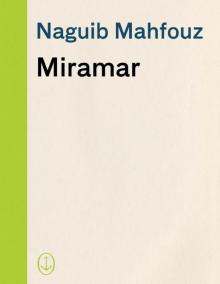 Miramar
Miramar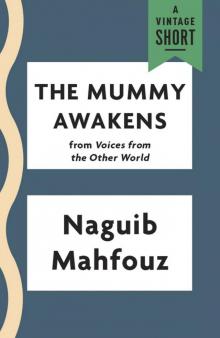 The Mummy Awakens
The Mummy Awakens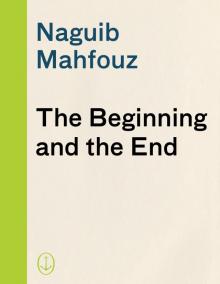 The Beginning and the End
The Beginning and the End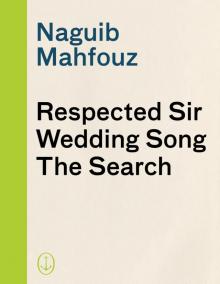 Respected Sir, Wedding Song, the Search
Respected Sir, Wedding Song, the Search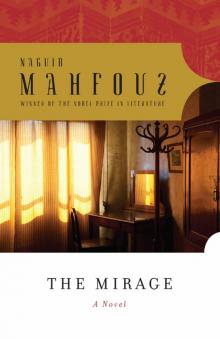 The Mirage
The Mirage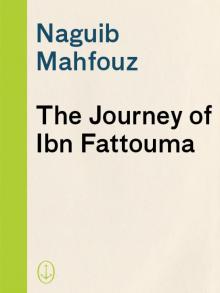 Novels by Naguib Mahfouz
Novels by Naguib Mahfouz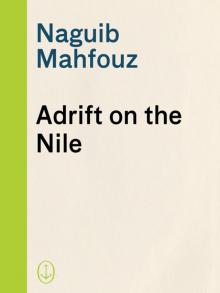 Adrift on the Nile
Adrift on the Nile Karnak Café
Karnak Café Heart of the Night
Heart of the Night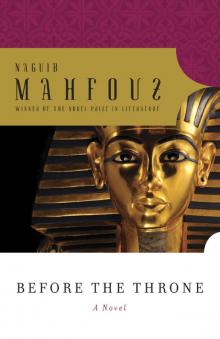 Before the Throne
Before the Throne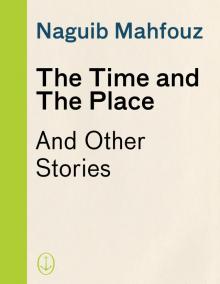 The Time and the Place: And Other Stories
The Time and the Place: And Other Stories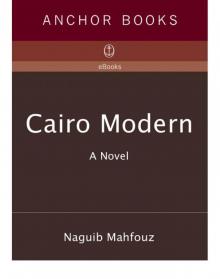 Cairo Modern
Cairo Modern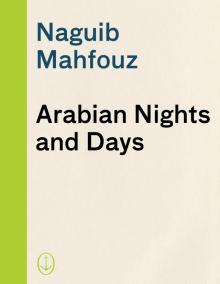 Arabian Nights and Days
Arabian Nights and Days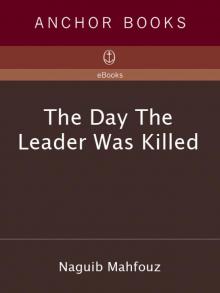 The Day the Leader Was Killed
The Day the Leader Was Killed Morning and Evening Talk
Morning and Evening Talk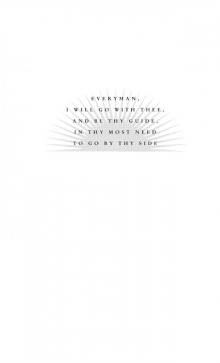 Three Novels of Ancient Egypt Khufu's Wisdom
Three Novels of Ancient Egypt Khufu's Wisdom Akhenaten: Dweller in Truth
Akhenaten: Dweller in Truth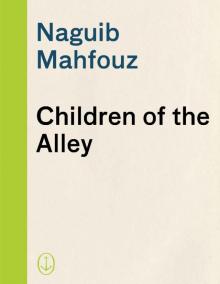 Children of the Alley
Children of the Alley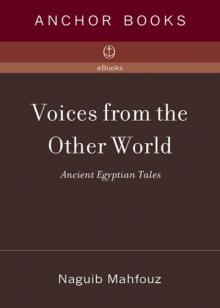 Voices From the Other World
Voices From the Other World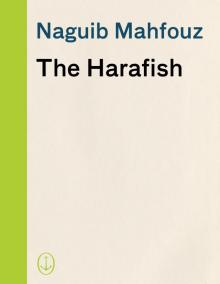 The Harafish
The Harafish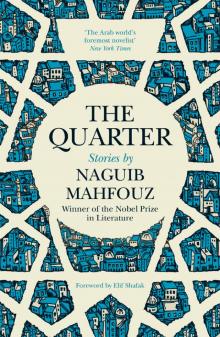 The Quarter
The Quarter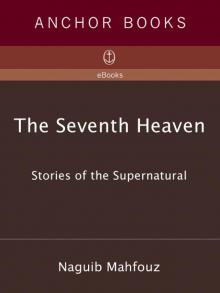 The Seventh Heaven: Supernatural Tales
The Seventh Heaven: Supernatural Tales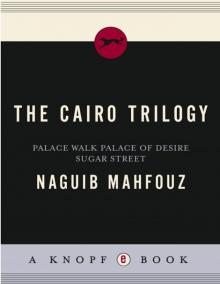 The Cairo Trilogy: Palace Walk, Palace of Desire, Sugar Street
The Cairo Trilogy: Palace Walk, Palace of Desire, Sugar Street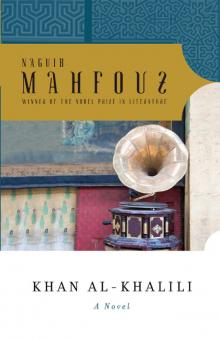 Khan Al-Khalili
Khan Al-Khalili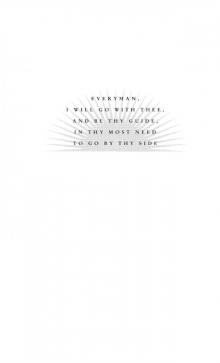 Three Novels of Ancient Egypt Khufu's Wisdom, Rhadopis of Nubia, Thebes at War
Three Novels of Ancient Egypt Khufu's Wisdom, Rhadopis of Nubia, Thebes at War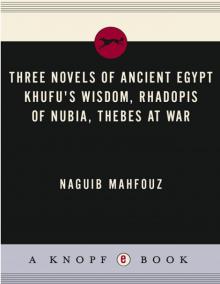 Three Novels of Ancient Egypt
Three Novels of Ancient Egypt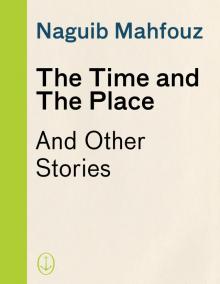 The Time and the Place
The Time and the Place Palace Walk tct-1
Palace Walk tct-1 Akhenaten
Akhenaten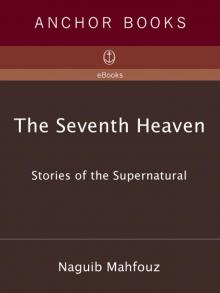 The Seventh Heaven
The Seventh Heaven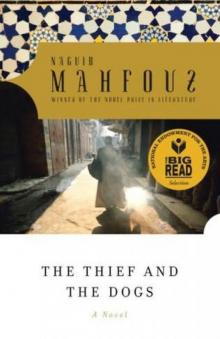 The Thief and the Dogs
The Thief and the Dogs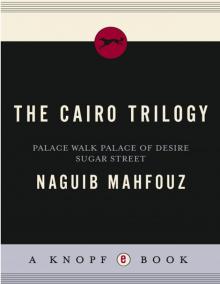 The Cairo Trilogy
The Cairo Trilogy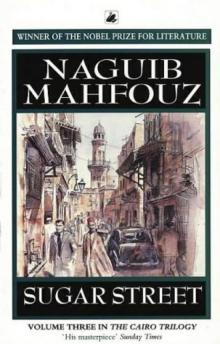 Sugar Street tct-3
Sugar Street tct-3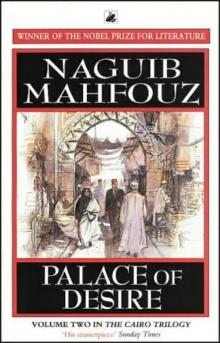 Palace of Desire tct-2
Palace of Desire tct-2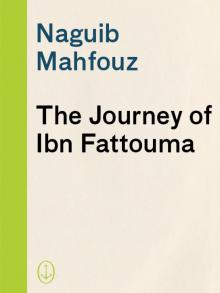 The Journey of Ibn Fattouma
The Journey of Ibn Fattouma